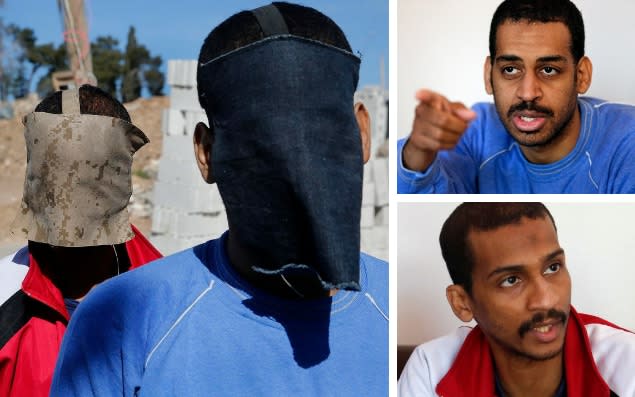Isil Beatles: Government right not to block death penalty, High Court rules

The High Court has rejected a challenge over the UK Government's decision to share evidence with US authorities about two suspected Islamic State terrorists without seeking assurances they will not face the death penalty.
El Shafee Elsheikh and Alexanda Kotey are accused of belonging to a brutal four-man cell of Isil executioners in Syria, nicknamed The Beatles because of their British accents, responsible for killing a number of high-profile Western captives.
The pair were captured in January last year, sparking a row over whether they should be returned to the UK for trial or face justice in another jurisdiction.
Mr Elsheikh's mother, Maha Elgizouli, challenged Home Secretary Sajid Javid's decision - revealed exclusively in The Telegraph - to share 600 witness statements gathered by the Metropolitan Police with US authorities under a "mutual legal assistance" (MLA) agreement without seeking assurances the men would not face execution if they were extradited and tried there.
The Lord Chief Justice Lord Burnett and Mr Justice Garnham, who heard her case, convened on Friday and backed the Government's decision by ruling against the mother.
The Lord Chief Justice, Lord Burnett, sitting with Mr Justice Garnham, said: "There is no general, common law duty on Her Majesty's Government to take positive steps to protect an individual's life from the actions of a third party and that includes requiring particular undertakings before complying with the MLA request."
Home Secretary Sajid Javid said: "I am pleased the Court has upheld my decision on all grounds in this case. My priority has always been to ensure we deliver justice for the victims’ families and that the individuals suspected of these sickening crimes face prosecution as quickly as possible.
"Our longstanding opposition to the death penalty has not changed. Any evidence shared with the US in this case must be for the express purpose of progressing a federal prosecution."

During a hearing in October Ms Elgizouli's lawyers said Mr Javid's decision, which was outlined in a letter to then US attorney general Jeff Sessions, was "unprecedented and unjustified" and put the suspects at risk of an "inhuman punishment".
Edward Fitzgerald QC told the court Mr Javid's decision was taken "against advice from officials" that an assurance should be sought.
The barrister said it was influenced by the "anticipated outrage" of members of the Trump administration if the UK asked for assurances that the pair would not face the death penalty.
He told the court: "We say that, in taking those steps, he wrongly exposed the suspects to the very real risk of an inhuman punishment.
"We say this country should not facilitate the imposition in another country of a punishment which we ourselves recognise as inhuman and unlawful.
"He took those steps in large part because of the anticipated outrage of certain political appointees in the Trump administration if the UK insisted on death penalty assurances.
"We submit that the anticipated outrage of those US officials was not a proper consideration as a matter of law."
Kotey and Elsheikh, who were raised in the UK, are believed to be detained by Kurdish forces in Syria and have been stripped of their British citizenship.
They are said to have been members of the cell which also included Mohammed Emwazi, known as Jihadi John, who was killed in a US air strike in 2015, and Aine Davis, who has been jailed in Turkey.
Emwazi appeared in a number of videos in which hostages, including British aid workers David Haines and Alan Henning and US journalists James Foley and Steven Sotloff, were killed.
The Crown Prosecution Service (CPS) decided there is "insufficient evidence" to prosecute them in the UK.

After Ms Elgizouli launched legal action, the Home Office announced in July that it had agreed to a "short-term pause" of the MLA process with the US.
Mr Javid faced intense criticism after the letter he wrote to Mr Sessions was leaked, with MPs accusing him of breaching the UK's long-standing opposition to the death penalty.
The Government's former reviewer of anti-terror legislation, Lord Carlile, branded the move "extraordinary" and said it was a "dramatic change of policy".
Prime Minister Theresa May supported Mr Javid's original decision, which was also backed by Boris Johnson when he was foreign secretary.
But the MLA sparked widespread criticism in Westminster from across the political divide.
Allan Hogarth, Amnesty International UK’s Head of Policy and Government Affairs, said: "This is a disappointing ruling and must not, on any account, be used by the Government as precedent for discarding its principles on the death penalty in future cases.
"The alleged crimes of Kotey and El-Sheikh are appalling, but the UK was wrong to have set aside its principled opposition to the death penalty like this.
"The death penalty is cruel and regularly used after unfair trials in countries with terrible human rights records, and the UK’s longstanding opposition to the death penalty must not be undermined.
"The Government should now put it on record that it will never again drop its opposition to the death penalty in this way."

 Yahoo News
Yahoo News 
